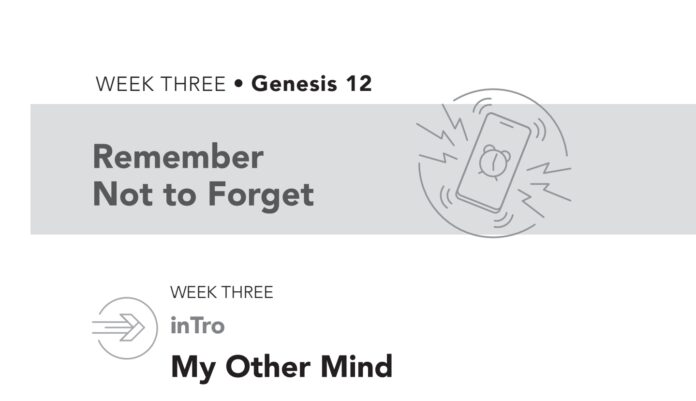Remember Not to Forget | Week 03
Week’s Passage: Genesis 12
inTro
My Other Mind
An associate pastor encouraged church members to take a selfie with someone, commit to praying together for a week, and post their commitment online. The narrator partnered with a teen named Derwyn but worried about remembering to pray daily. To stay consistent, they set a 5:00 a.m. phone reminder, which continues years later. This modern memory aid is likened to the altars of remembrance in biblical times, where people commemorated profound encounters with God. These altars symbolized consecration, worship, and a commitment to never forget God’s mighty acts. This week’s focus is on Abraham’s altar of remembrance, built in response to God’s astounding promise.
inGest
A promise Worth Remembering
Genesis 12 recounts God’s call to Abram (later Abraham) to leave his home and journey to an unknown land that God would show him. Abram, at 75 years old, obeyed immediately, taking his family and possessions to Canaan. God promised to make Abram’s descendants into a great nation, give them the land of Canaan, and make him a blessing to the world.
In response, Abram built altars to honor and worship God. These altars symbolized his growing devotion and commitment to follow God wherever He led. The second altar, built near Bethel, highlights Abram’s desire for a close relationship with God, to remember His promises and presence. These altars served as spiritual milestones, marking Abram’s journey of faith and obedience.
inTerpret
Problem In the Promise
Genesis 12:6
Abraham entered Canaan despite the dangers posed by the corrupt Canaanites, trusting in God’s promise, “I am your shield” (Gen. 15:1). Through prayer and worship, he deepened his relationship with God, building visible altars as symbols of faith and tools for evangelism. These altars proclaimed his allegiance to God and inspired others to worship, demonstrating how devotion can lead others to faith.
inVite
A Helper Appears
Genesis 13 highlights Abraham’s habit of building altars, such as the peace altar at Mamre, which commemorated God’s help in resolving strife with Lot. In Genesis 22, Abraham faced his greatest test when asked to sacrifice Isaac. He obeyed, but God provided a ram as a substitute, prefiguring Christ’s sacrifice. Abraham named the place “The-Lord-Will-Provide” (Gen. 22:14), memorializing God’s provision.
Remembering God’s goodness is vital for faith. People honor Him in various ways, such as naming places, sharing testimonies, journaling, or acts of kindness. These practices deepen our gratitude and strengthen our relationship with God.
inSight
A Friend of God
Abraham obeyed God’s call, leaving Ur for Haran with his family. After Terah’s death, he continued to Canaan with Sarah, Lot, and his servants. In Shechem, a fertile land overshadowed by idolatry, God promised to give the land to Abraham’s descendants. Encouraged by this assurance, Abraham built altars to worship God in Shechem and near Bethel. Known as “the friend of God,” Abraham exemplified a life of prayer, consistently calling his household to worship through morning and evening sacrifices.
inQuire
- What do you find significant about Abraham’s commitment to worship?
- What example was Abraham setting for his household through his personal devotional walk with God?
- What practices help you remember God’s goodness and kindness to you?
- How do you think Sarah reacted when Abraham told her they had to leave Haran immediately?
- If Abraham had proven faithful to God in times past, why did God subject him to the ultimate test of sacrificing his son on the altar?



